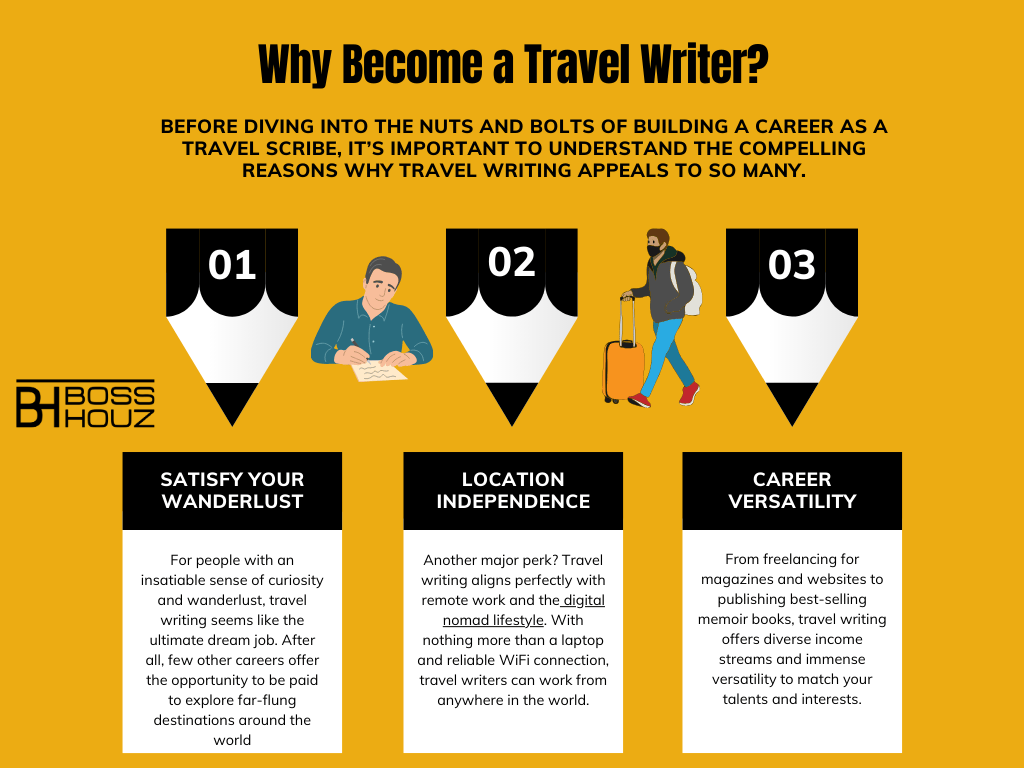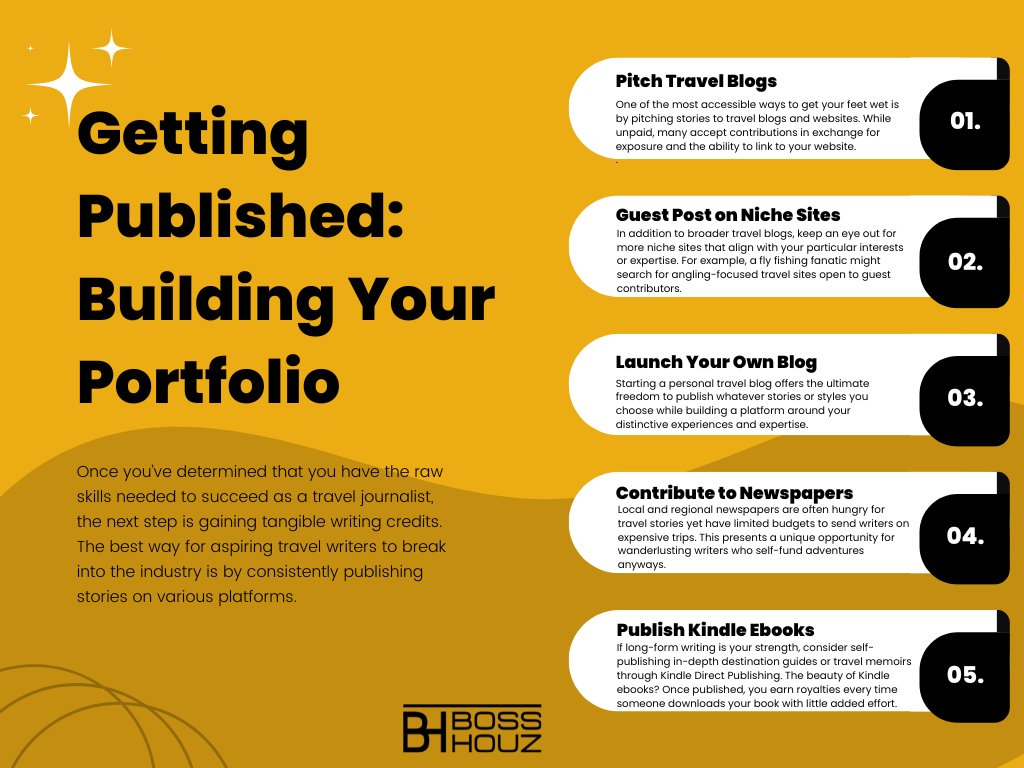Have you ever dreamed of traveling the world and getting paid to write about your adventures? If so, you’re not alone. Many aspiring writers and world travelers wonder how they can become travel writers, turning their passion for globetrotting into a full-time career.
The good news? The travel writing industry is booming. As more people seek out authentic, first-hand travel stories, publications from glossy magazines to major news outlets are hungry for compelling and immersive content that transports readers across the globe. This growing demand for quality travel journalism presents a unique opportunity for skilled writers ready to take the plunge.
So how do you begin on the road to becoming a bonafide travel writer? This comprehensive guide breaks down the key steps for developing the skills, building your portfolio, landing paid gigs, and establishing yourself as an expert in the field of travel writing in 2024 and beyond.
Table of Contents
Why Become a Travel Writer?


Before diving into the nuts and bolts of building a career as a travel scribe, it’s important to understand the compelling reasons why travel writing appeals to so many.
Here are some of the biggest perks and benefits that come with this adventurous career path:
Satisfy Your Wanderlust
For people with an insatiable sense of curiosity and wanderlust, travel writing seems like the ultimate dream job. After all, few other careers offer the opportunity to be paid to explore far-flung destinations around the world – from bustling urban jungles to secluded tropical paradises. Travel writers enjoy immersive cultural experiences that allow them to satisfy their passion for adventure while producing compelling stories.
<div class=”callout-tip”>
Pro Tip 💡
Many established travel writers structure their year to spend extended periods focused entirely on writing, interspersed by 1-3 month blocks of intensive travel, during which they gather fresh stories and photography. This enables more productive writing periods while still regularly feeding their wanderlust.
</div>
Location Independence
Another major perk? Travel writing aligns perfectly with remote work and the digital nomad lifestyle. With nothing more than a laptop and reliable WiFi connection, travel writers can work from anywhere in the world. This offers ultimate schedule flexibility and locational independence to match your own ideal lifestyle.
You might spend one month reporting a story from a houseboat in Kerala, India before migrating to spend the next 3 months writing from an apartment in Lisbon, Portugal without missing a beat. The world is your oyster – and office!
Career Versatility
From freelancing for magazines and websites to publishing best-selling memoir books, travel writing offers diverse income streams and immense versatility to match your talents and interests. Those more comfortable behind the camera can focus on travel photography and Instagram influencing, while talented writers might become correspondents for major newspapers or land book deals.
Others leverage travel blogs and online courses to build their personal niche brand as a digital nomad expert. No two travel writing careers look alike, offering the flexibility to adapt your focus over time.
Skills You’ll Need as a Travel Writer
While travel writing certainly has an element of glamor and excitement, succeeding in this competitive industry requires dedication and specific skills that not everyone possesses.
Before you clear out your savings account to galavant across Southeast Asia, make sure you cultivate these essential aptitudes.
Engaging Writing Ability
This one goes without saying – exceptional writing skills are non-negotiable. Travel writers must craft compelling narratives that transport readers into a vivid sense of place, acting as their eyes, ears, and guide on an exhilarating journey. Strong command over language, syntax, diction, and prose are essential to becoming a truly immersive storyteller.
You’ll also need to master the nuances of different writing formats, from long-form narratives to punchy blog posts or magazine pitches. Excellent listening and observational skills also help travel writers gather intriguing details to inject color into their stories.
Research Skills
In addition to writing talent, you’ll need to excel at research. Travel writers must gather extensive background on destinations to provide context, nail down precise factual details, verify information, and hunt for undiscovered gems to spotlight.
This requires tenacity to pore through dense histories, data, and records in order to unearth and articulate engaging stories. Strong research skills also help you identify popular trends to anchor your pitches and finished pieces.
<div class=”callout-tip”>
Pro Tip 💡
Travel writing shares similarities with investigative journalism. Hone your research skills by practicing investigation techniques on a place you know well. Analyze public records, interview locals, search for obscure landmarks – you’ll likely uncover fascinating details that can inform future travel stories.
</div>
Social Media & Marketing Chops
Love it or hate it, you can’t avoid social media and marketing skills if you want to make it as a 21st century travel writer. Building your personal brand and audience on platforms like Instagram and Facebook is crucial for establishing credibility – especially when first starting out.
Understanding SEO optimization can help your travel blog rank higher while familiarity with advertising platforms gives you an edge when promoting published works. Savvy self-promotion skills allow you to build the influential platform needed to land exciting press trips, sponsorships, and partnerships.
Photography Skills
While some travel writers delegate photo duties to a photographer teammate, most choose to handle their own photography. With photo-centric stories now dominating the industry, having an eye for captivating visuals can be a huge asset.
Learning fundamental techniques like composition, lighting, and editing helps you take publishable photographs to complement your articles. As the saying goes, “a picture is worth a thousand words”, so brush up on basic photo skills before hitting the road.
Getting Published: Building Your Portfolio


Once you’ve determined that you have the raw skills needed to succeed as a travel journalist, the next step is gaining tangible writing credits. The best way for aspiring travel writers to break into the industry is by consistently publishing stories on various platforms.
This gradually builds your portfolio and brand while allowing you to experiment across different genres and styles to find your specialty.
<div class=”callout-tip”>
Pro Tip 💡
When just starting out, prioritize regular publishing of travel content over income. Making $50 for a blog post may seem underwhelming, but the long-term value of building your portfolio outweighs short-term profits.
</div>
Here are some of the best outlets to target when first building your portfolio:
Pitch Travel Blogs
One of the most accessible ways to get your feet wet is by pitching stories to travel blogs and websites. While unpaid, many accept contributions in exchange for exposure and the ability to link to your website.
Some popular platforms that regularly publish novice writers include:
- Matador Network
- Everything Everywhere
- Adventurous Kate
- The Points Guy
- Nomadic Matt
When pitching these sites, thoroughly research their content style and past articles. Tailor your pitch and writing sample accordingly, demonstrating an understanding of their brand. Offer unique perspectives they haven’t covered before to increase the odds they’ll give you a shot.
Guest Post on Niche Sites
In addition to broader travel blogs, keep an eye out for more niche sites that align with your particular interests or expertise. For example, a fly fishing fanatic might search for angling-focused travel sites open to guest contributors.
Similarly, those with extensive backpacking experience in Latin America could target Central American travel blogs. Catering your pitches to niche sites allows you to establish yourself as an expert in that particular realm. This helps build credibility and trust with readers and editors.
Launch Your Own Blog
Starting a personal travel blog offers the ultimate freedom to publish whatever stories or styles you choose while building a platform around your distinctive experiences and expertise. This also allows you to experiment with different monetization strategies like affiliate links, advertising, sponsored posts, and travel gear reviews.
While launching a profitable blog has some upfront effort, it establishes your personal brand and gives editors a hub to evaluate your skill level.
<div class=”callout-tip”>
Pro Tip 💡
Increase discovery and click-through rates on your travel blog by incorporating high quality photographs, helpful maps, informative tables, and easy-to-scan formatting like section headers and bullet points.
</div>
Contribute to Newspapers
Local and regional newspapers are often hungry for travel stories yet have limited budgets to send writers on expensive trips. This presents a unique opportunity for wanderlusting writers who self-fund adventures anyways.
By preemptively traveling to a destination that interests newspaper editors, you can gather publishable material then pitch compelling stories on spec. This demonstrates initiative to editors while allowing you to potentially land a sweet newspaper byline.
Publish Kindle Ebooks
If long-form writing is your strength, consider self-publishing in-depth destination guides or travel memoirs through Kindle Direct Publishing. The beauty of Kindle ebooks? Once published, you earn royalties every time someone downloads your book with little added effort.
Kindle bestsellers also establish your expertise and can lead to coveted book deals with major publishers. The low barrier makes Kindle publishing ideal for first-time authors.


Pitching Publications: Getting Paid as a Travel Writer
Once you have some published clips under your belt, you can start pitching respected publications that actually pay for contributions. Breaking into paid print and digital magazines represents a significant milestone for travel writers.
In addition to income, landing bylines in major media outlets massively boosts your credibility and future earning potential in the industry.
Here are some tips for getting your pitches accepted:
Target the Right Publications
Wasted pitches are any travel writer’s greatest frustration. Narrow down publications suited to your niche and voice. For example, backpackers should pitch budget adventures to Outpost Magazine while luxury travelers may write for Travel + Leisure.
Study multiple issues of a publication before pitching to ensure your idea aligns with their content mix and house style. Rushed, generic pitches signal laziness to editors.
Lead With Your Strengths
Play to your personal strengths and interests when ideating pitches rather than gravitating to whatever’s currently trendy. For example, an adventurous photographer might pitch an off-the-beaten-path hiking story in the Andes supported by stunning images. Meanwhile, a wildlife nut could offer an inside look at the elusive snow leopards of Central Asia based on access to expert researchers.
Whatever your specialty, lead with that unique passion, perspective, or access to convince editors you’re the best person to tell this story.
Focus on Timeliness
Editors prioritize timely articles that feel relevant by tapping into current trends, news events, or seasons. Pitch autumn culture stories in summer rather than waiting until fall when that ship has probably sailed.
Tying proposals to new hotel openings, cultural festivals, emerging destinations, or anniversaries also increases the odds your pitch will strike an editor’s interest thanks to its timely news hook.
Pitch Template Breakdown
Convinced your pitch needs work? Use this paint-by-numbers formula to craft irresistible proposals tailored to travel outlets:
| Pitch Section | Details to Include | Why It Matters |
| The Hook | <li>Timely news angle tying your destination/story to current events or trends <li> Any exclusive access or partnerships that give you an edge over other writers | Gives the editor an immediate reason why your pitch deserves priority over the rest |
| The Story | <li>Thematic focus of your piece <li> Specific locations/sights within the destination you’ll spotlight <li> Any interactive elements like maps, graphics, or polls you can provide | Fleshes out the actual substance of your story along with visuals to catch the editor’s eye |
| The Details | <li> Proposed word count range <li> Links to 3-5 previously published clips showcasing your best work <li> Deadline availability/flexibility | Shows you understand the publication’s format needs and demonstrates your writing caliber through past successes |
| The Author | <li> 1-2 sentences on your relevant expertise such as past adventures, accolades, or access related to the pitch <li> Brief background on your previous esteemed publications | Quickly establishes you as the best person to write this story by highlighting your qualifications |
<br>
While pitching often feels like an endless barrage of rejection, perseverance pays off. Use every pitch attempt as a chance to tweak your approach based on editor feedback. Study what gets rejected vs. accepted. Soon you’ll crack the code on proposals that get your foot in the publishing door as a paid travel journalist.
Long-Term Career Paths in Travel Writing
Part of determining how to become a travel writer involves deciding if you want it as a short-term gig or full-time career path. Depending on your goals and priorities, travel writing can be structured as a career springboard, lifelong endeavor, or some shifting combination of the two.
Here are four common long-term trajectories to consider:
1. Build Your Name Then Switch Genres
Some writers leverage travel writing to build a reader following before transitioning into general journalism, broadcasting, editing or even politics. The skills gained and audiences accrued during their globe-trotting days gives them a leg up when changing fields.
2. Settle Down as an Editor
The life of living out of a suitcase can lose its charm after years on the road. Some travel writers leverage their industry expertise and connections to transition into editing roles with magazines, guidebook series, or digital publications. This allows them to send other writers out into the field while using their own adventures to inform an editorial vision from headquarters.
3. Specialise as a Guidebook Writer
Rather than general travel stories, some writers choose to specialize in guidebooks for specific destinations or activities. From Michelin restaurant reviewers and Lonely Planet destination experts to niche guidebooks on topics like wildlife photography safaris, adventure hiking, or RV travel – niche guide writing lets you dig deep on a topic you love.
4. Build Your Own Brand & Business
Other travel journalists go the entrepreneurial route – launching personal blogs, photography sites, boutique agencies, or travel gear companies. By publishing books, keynoting conferences, or selling photography prints, it’s possible to build a location-independent business fueled by your travel insights. While risky, this path offers the most financial and creative upside over time.
There’s no one “right” long-term travel writing career progression. By regularly reevaluating your goals and priorities while continuing to nurture your skills and connections, you can craft a custom career path as unique as the journeys you chronicle.
Wrap Up: How to Ignite Your Travel Writing Career
As this extensive guide demonstrates, a career as a travel writer offers immense freedom, versatility and adventure – but requires real dedication, effort and skill to stick with over the long haul.
By relentlessly seeking out publishing opportunities, carefully crafting pitches, and delivering compelling stories imbued with insider access, you can gradually ascend the ranks of professional travel journalism.
Just remember, be patient and stick to your strengths rather than chasing trends. Perseverance and consistency are key.
Soon you’ll land bylines in coveted magazines, accrue free press trips, speak at conferences, and potentially publish best-selling memoir books. That’s the true realization of wanderlusting writers’ dreams.
The world needs more authentic voices to transport readers to exotic corners of the globe. So rather than daydreaming about far-flung adventures from the comfort of your desk, take action on turning travel writing into a full-time endeavor.
Pack your bags… and start writing the next chapter!
FAQs: Additional Questions on Becoming a Travel Writer
Still have some lingering questions before embarking on your travel writing quest? Here are answers to some of the most frequently asked questions:
Do you need a journalism degree to become a travel writer?
While a degree in journalism, communications or English can be helpful, it’s not strictly necessary. Some of the most successful travel writers come from totally unrelated backgrounds and are self-taught. That said, taking some travel writing courses to sharpen key skills is a smart investment.
What types of skills are most important for aspiring travel writers?
Excellent descriptive writing skills are non-negotiable above all else. You also need sharp research abilities, social/pitching skills to sell your work, and basic photography chops. Curiosity, resilience and networking talents also help you land exciting writing opportunities.
How much do travel writers earn on average?
Income varies widely based on publication types, consistency, niches and notoriety. While freelancers typically earn between $125 – $500 per online article, print features can pay $1,000 – $5,000 apiece at major outlets once established. Landing a book deal offers a big payday around $30,000 – $250,000.
What are some reputable publications that publish new travel writers?
Great starter outlets include Matador Network, Adventure Journal, Extra Mile Travel, Everything Everywhere, SmarterTravel, AFAR Media, Roads and Kingdoms, Atlas Obscura, and many more depending on your niche.
Should I start my own travel blog?
Launching your own site allows you to freely publish content while building a personal brand. However, blogs take significant effort before turning profitable. Prioritize pitching other sites first to gain experience and clips, then start a blog to diversify income streams once established.








